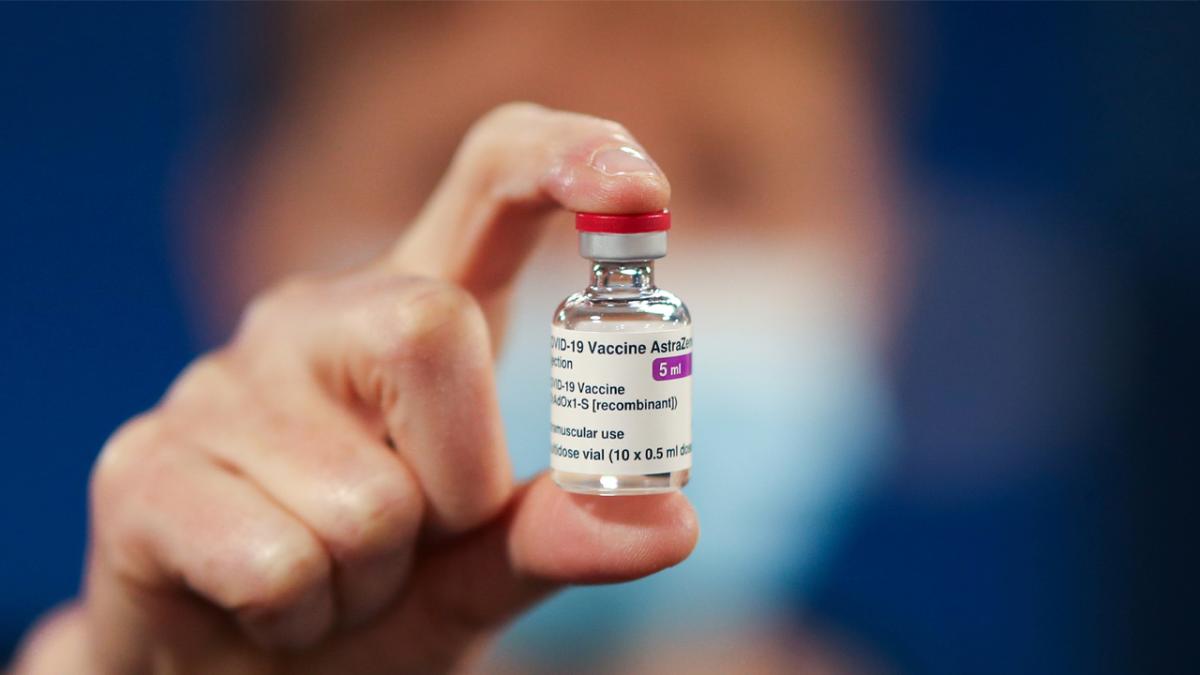
Are you considering getting the AstraZeneca vaccine? Great! We have heaps of it in stock, it’s incredibly safe and effective, and bringing our vaccination rates up is the key to getting out of this mess.
However, it’s understandable that you might be nervous. We asked you via our Instagram stories for your key questions around the AstraZeneca vaccine, and got a lot. Like, heaps.
Then we spoke to Dr Nick Coatsworth, infectious diseases expert and former federal Deputy Chief Medical Officer.
Before we get into that, a quick reminder of what’s going on here:
Some people can develop a very, very (very) rare blood clot after getting the AstraZeneca vaccine. In technical terms, it’s called thrombosis thrombocytopenia syndrome (TTS). This is extremely treatable if you seek medical attention. For Australians under 50 years old, the risk is about one in 35,000 (for the over 50s, the risk is one in 50,000). Of that tiny risk, the risk of death is about five percent.
In other words, your risk of dying as a result of vaccination is less than one in one million. Your risk of dying from COVID is much, much higher (and we go into that further down).
Let’s get vaccinated, people – any way we can. Meanwhile, here’s some of your biggest questions, answered.
What are the blood clot symptoms to look out for?
The key one is a headache that’s not going away with pain meds, on around Day 4 to Day 20 after getting your jab. That’s when you need to be seeking urgent medical care, a.k.a. going to the emergency department.
“It’s not a mild headache,” Coatsworth said. “It might start with one but it will get worse.”
The tricky thing here is that a mild headache is also one of the most common side effects of the vaccine, with about 6 in 10 people experiencing it after their first dose.
“You should expect fatigue, a headache, shivers, chills, feeling fluey – all of that is likely to happen in the first couple of days,” Coatsworth said.
“That doesn’t mean you have a clot in your brain. It’s when you have a headache that’s not getting better with Panadol, it’s getting worse, and it’s happening from Day 4 onwards, that’s when you have to seek medical attention.”
In dot point form, it’s a headache that:
- Starts at least four days after vaccination
- Doesn’t improve with pain relief
- May be worse when lying down
- May be accompanied by nausea and vomiting
Other symptoms to look out for are:
- Blurred vision
- Difficulty speaking
- Difficulty breathing
- Chest pain
- Drowsiness
- Seizures
- Swelling in the leg
- Persistent abdominal pain
- Tiny blood spots under the skin, away from the site of injection
Will Nurofen reduce my chances of getting blood clots?
No, not at all.
“There’s only one drug that effective once you have the clot, but if you get it in time, then you will almost never die from the clot,” Coatsworth said.
“If people work out that you have this problem and you get treatment, then treatment is awesomely effective.”
How do you treat blood clots and how effective is it?
As above – the treatment is really, really effective! If you present to your GP or an emergency department with symptoms, doctors will do a blood test to count your platelets. Normally your platelets fall between 150,000 and 450,000 per microlitre of blood, but if your count is lower than 150,000, that results in thrombocytopenia syndrome (TTS). If you have low platelets, then they’ll test for the presence of protein fragments called D-dimers. If you have D-dimers five times higher than normal levels, it might be TTS. (Psss: the ABC did a deep dive into this entire process.)
Here’s the good news: these tests are fast. You’ll then be put on blood thinners and a dose of immunoglobulins, which will usually take a couple of days to get you back to normal.
The key thing to keep top of mind: blood clots following an AstraZeneca dose are very, very rare. And those very rare blood clots are easily treatable.
Can we know more about the blood clot symptoms that were reported in cases of deaths?
Unfortunately not – the Therapeutic Goods Administration (TGA) has not released those details.
Are there any pre-existing or underlying health conditions that would mean you’d recommend waiting for Pfizer?
Yes, there’s four. They’re very, very rare conditions that hardly any Australians have. Your GP will know about them, but you can also read up on them here.
Is there anything we can do to find out if we’re predisposed to AstraZeneca blood clots?
In terms of a blood test, there’s nothing Australia can roll out at a population-level that will be helpful. Keep an eye out for the very, very rare symptoms post AstraZeneca and seek medical attention if you’re worried.
Is it safe if you have high blood pressure?
Yep. And putting his money where his mouth is: Coatsworth takes blood pressure meds and had the AstraZeneca vaccine (he’s 43).
Let me repeat that again. Do not wait for the Pfizer vaccine if the AstraZeneca vaccine is available to you.
— Dr. Nick Coatsworth (@nick_coatsworth) August 4, 2021
If I have an aneurysm, do I have to wait for Pfizer?
An aneurysm won’t have an impact, Coatsworth says, but obviously for specific medical concerns, talk to your GP.
Is there more of a risk with AstraZeneca if you’re overweight or obese?
No, but it’s a “deep, deep concern for dying of Covid,” Coatsworth said.
“If you’re obese [defined as having a BMI greater than 30], and you go to intensive care with any respiratory problem, then your likelihood of dying is much, much higher than anyone else, no exception for Covid. Get vaccinated.”
What is the risk for a woman in her 30s?
It’s about 3 in 100,000 – and that’s to develop a blood clot, not die. Again, a blood clot is very easy to treat.
Am I at more risk if I’m on birth control?
Nope. “They’re not additive risks at all,” Coatsworth said.
Does it affect your fertility?
So initially, there was some concern that because some women were getting heavier periods, it would lead to fertility concerns, Coatsworth said. However, there’s no evidence.
“The most conclusive study we’ve got is that there were no miscarriages in pregnant women who took the vaccine,” Coatsworth said.
“We haven’t done the studies on fertility, but there is no evidence it’s a concern, and we know it doesn’t cause miscarriages.”
Is it safe after birth / breastfeeding?
Yes. completely safe. In fact, for breastfeeding parents, Coastworth says it’s more than safe, because like any vaccine, it gives you antibodies to a disease that stops your infant from getting it, which are transferred via breast milk.
Are there concerns it affects sperm if you’re trying to get pregnant?
Nope. This is another concern that has unfortunately gone viral. There is no evidence any COVID vaccination will effect male fertility, and a lot to say a vaccine will help you not get COVID.
My mum clotted from the first dose, should I opt for Pfizer?
Unfortunately this person didn’t provide any more details, such as which vaccine her mum had or whether it was a diagnosed case of TTS.
However, Coatsworth said there are about 50 Australians every single day that have blood clots, even before AstraZeneca. And unless somebody has been diagnosed with TTS, then it’s not related to the vaccine. Again, for specific medical concerns: please chat to your GP.
Does it change your DNA?
Nope, definitely not. AstraZeneca doesn’t have anything that resembles DNA. As for the Pfizer, which is an MRNA vaccine, it doesn’t go anywhere near the nucleus of your cell, and that’s where the DNA is.
I’m pregnant – how do I know science won’t discover I’ve damaged my kid in a couple years?
FYI, this question was about the Pfizer vaccine, as that’s the one recommended for pregnant women right now.
“That’s a completely understandable fear, but there is no plausible way it would harm the kid,” Coatsworth said.
“The vaccines don’t change anything about cells, or growth, or DNA, so it won’t do stuff like thalidomide did in the 80s.”
Why do different Chief Health Officers have different views? NSW is saying yes, but Queensland is saying no.
Basically: different people have different ways of assessing risk.
“Some are very conservative,” Coatsworth said.
However, Queensland CHO Jeanette Young finally changed her tune on AstraZeneca and young people in the past week: she’s now asking people under 60 to speak to their GP about getting AstraZeneca.
When will we get boosters?
Not right now. The effectiveness of AstraZeneca after a second dose for the Delta strain is over 90%. And once all of Australia is vaccinated, we need to vaccinate the rest of the world before giving ourselves a booster shot. COVID is spreading out of control in our nearest neighbours.
How do I convince my boyfriend to get AstraZeneca and not wait for Pfizer? (I’ve had my first dose of AstraZeneca)
Tell him you don’t want him to give you COVID, Coatsworth said, so he should go and get AstraZeneca. Or tell him you won’t see him until after he’s had a Covid vaccine (any Covid vaccine), so if he wants to wait a couple months to get Pfizer and see you, that’s on him.
Elsewhere, here’s a list of the best reasons to get AstraZeneca now instead of waiting for Pfizer (if that’s the right medical decision for you).
What is the actual risk of dying from a blood clot versus dying from COVID?
So – there’s not a lot of specific, accurate data relating to young people on this, because relatively few people in Australia aged between 20 and 40 have had COVID. However, your risk of death from COVID is a lot higher than a blood clot.
For young people, their risk of dying from COVID is anywhere between one in 100 and one in 10,000, Coatsworth said. “And if you’re a young person, that is not a dice you want to be rolling.”
In the broader population, COVID kills about 3% of people and causes long-term illness in 10 to 30% of people.
Your risk of dying from TTS is less than one in one million.
Why are they [we assume the government] forcing this on us? We don’t want it.
Yep, this was a question – and we put it to Coatsworth.
“No one is forcing anything on anyone,” he said. “We don’t expect everyone to change their minds about AstraZeneca, but the more people who do, we can get there faster. If everyone waits for Pfizer, then we’re a bit screwed. But if a couple of people change to AstraZeneca, there’s going to be a multiplier effect.”
Cannot stress this enough: please get vaccinated, with the first one available to you,
On a scale of 1 to fucked up, how badly did the govt fuck this up?
Another real question that yes, we put to Coatsworth! The man is here to answer your questions.
“About a five?” he said. “I don’t know. But vaccines are a community thing, we’re all responsible for it.”
He added: “The entire Australian community, both government and individuals, have not shone in this campaign. But it’s time for us to step up and sort it out.”
Let’s do this, people. And if you’re not already following our daily vaccine update on Instagram, here’s the latest (as of August 5).







